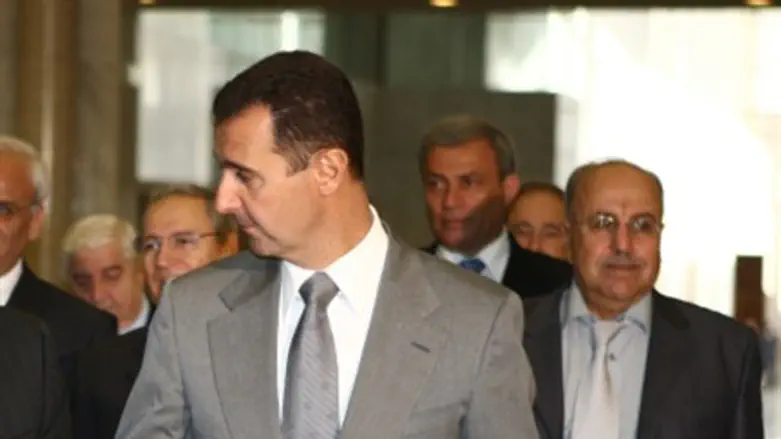
Syrian forces loyal to President Bashar al-Assad have fired Scud missiles at rebel fighters in recent days, Obama administration officials said on Wednesday, according to The New York Times.
The move represents a significant escalation in the fighting, which has already killed more than 40,000 civilians in a nearly two-year-old conflict and suggests increased desperation on the part of the Assad government, the report said.
A fresh wave of mayhem struck the Syrian capital Damascus on Wednesday, including a deadly triple bombing outside the Interior Ministry. One American official, who asked not to be identified because he was discussing classified information, told the New York Times that missiles had been fired from the Damascus area at targets in northern Syria.
“The total is number is probably north of six now,” said another American official, adding that the targets were in areas controlled by the Free Syrian Army, the main armed insurgent group.
It is not clear how many casualties resulted from the attacks by the Scuds, a class of Soviet-era missiles with a range of nearly 200 miles. It appeared, however, to be the first time that the Assad government had fired the missiles at targets inside Syria.
American officials did not say how they had monitored the missile firings, but American intelligence has been closely following developments in Syria through aerial surveillance and other methods, partly out of concern that Assad may resort to the use of chemical weapons in the conflict.
U.S. Defense Secretary Leon Panetta said on Tuesday that Syria had not taken any new steps in recent days that signal a readiness to use its chemical arsenal.
"At this point the intelligence has really kind of leveled off. We haven't seen anything new indicating any aggressive steps to move forward in that way," Panetta told reporters aboard his plane before landing in Kuwait, AFP reported.
However, a former top general in Syria's chemical weapons program said on Monday he doesn't doubt for a moment that Assad will deploy his chemical weapons arsenal as he tries to hold onto power.
"The regime started to fall and deteriorate. It's coming to its end," retired Major General Adnan Sillou told ABC News. "It's highly possible that he'll start using [chemical weapons] to kill his own people because this regime is a killer.”
The Obama administration views the Assad government’s use of Scud missiles as a “significant escalation” of the conflict, a senior official told The New York Times. It also shows, he said, the increasing pressure on Assad, since Scuds are primarily defensive weapons, being used by the government offensively against a counterinsurgency.
“Using Scuds to target tanks or military bases is one thing,” the official said, speaking on condition of anonymity. “Using them to target rebels hiding in playgrounds at schools is something else.”
Among other repercussions the Obama administration fears is the possibility that Assad’s military could fire Scuds near, or over, the border with Turkey, which has become one of the Syrian president’s most ardent foes.
Military experts said the Assad government’s use of Scuds might reflect worries that its aircraft have been vulnerable to rebel air defenses. In recent weeks, rebel forces have captured Syrian military bases, seized air-defense weapons and used some of them to fire at Syria warplanes.
The Obama administration has yet to comment publicly on the missile attacks, but a senior administration official alluded to the development in a briefing for reporters on Tuesday.
“The Syrian regime has used aircraft,” the administration official said, according to The New York Times. “It has used artillery, and it appears that it has even used missile to attack the Syrian population and to attack what was a peaceful protest movement.”
The developments came as representatives of more than 100 countries and organizations that support the anti-Assad movement met in Morocco and endorsed a newly formed insurgent coalition as the legitimate representative of the Syrian people.
President Obama also formally acknowledged that coalition, known as the National Coalition of Syrian Revolutionary and Opposition Forces, in an interview on Tuesday with ABC News.
In Damascus on Wednesday, a car bomb and two other explosives went off outside the Interior Ministry headquarters — known as the House of Justice — in Kafar Souseh, on the southern outskirts, Syrian state media reported. Two Lebanese television channels that favor the Syrian government reported that there had been casualties, said The New York Times.
An activist in Damascus said Syrian security forces had sealed off Shami Hospital, a central Damascus facility used by Syria’s elite, in a possible indication of high-profile casualties in the blasts.
Government forces and rebels have been clashing for two weeks around Damascus as rebels try to take control of the airport road and security forces try to seal off the capital from a semicircle of increasingly rebel-held towns reaching from the northeast to southwest of Damascus’s suburban sprawl.
